Internet Filtering in Yemen in 2004-2005: A Country Study
1. Executive Summary
2. Political, Technical, and Legal Context in Yemen
A. Sensitive / Controversial Topics for Media Coverage
B. Internet Infrastructure and Access
C. Legal Background
3. Testing Methodology
A. Methods
B. Results Analysis
C. Methods Specific to Yemen
D. Topics Tested
4. Results and Analysis
A. Summary
B. Global List Results
C. Yemen Specific Results
D. Longitudinal Testing Results
5. Conclusion
Appendix 1
Appendix 2
Appendix 3
Appendix 4
Appendix 5
Appendix 6
Appendix 7
Appendix 8
Appendix 9
Appendix 10
1. EXECUTIVE SUMMARY
The Republic of Yemen limits what Internet content its citizens can access by using commercially available filtering technology and by controlling its two Internet service providers (ISPs), TeleYemen (operators of the service YNET) and YemenNet, through the state's powerful Ministry of Telecommunications. The OpenNet Initiative (ONI) tested the filtering systems of both ISPs, and found significant congruence but also notable differences between the two.1 Pornography is the primary target of both, but other types of content are targeted to varying degrees, including sex education and provocative clothing sites, gay and lesbian-related materials, gambling sites, dating sites, drug-related sites, sites enabling anonymous Web surfing, proxy servers that circumvent filtering, and sites with content related to converting Muslims to other religions.
The Republic of Yemen's legal regime involves relatively little formal restriction of Internet use and access, though the rules set by the ISPs include substantial restrictions on what may be accessed or published. These rules prohibit the access or publication of material deemed to be obscene or subversive on political or religious grounds. Human rights and other non-governmental organizations have complained that the Yemeni state restricts what journalists may write and how citizens use the Internet through a variety of means of intimidation. However, Internet access is readily available from homes or Internet cafés for those who can afford it.
To carry out its filtering regime, Yemen relies upon the commercial product Websense. ONI's testing reveals that TeleYemen blocks sites classified by Websense into the categories "Adult Content," "Lingerie and Swimsuit," "Nudity," "Gay or Lesbian or Bisexual Interest," and "Sex Education," and likely blocks the master category "Adult Material." TeleYemen also uses a category called "User-Defined," which enables a filtering entity to compile and block sites based on its own criteria. The sites included by TeleYemen in the "User-Defined" category primarily deal with religion and the religious conversion of Muslims. The specific Websense categories blocked by YemenNet are "Adult Content," "Lingerie and Swimsuit," "Nudity," "Sex Education," "Abused Drugs," "Marijuana," and "Gambling," and likely the master category "Adult Material."
While the Republic of Yemen substantially filters material on topics related to sex, sexuality and gambling, the state does not try to control broadly what its citizens see on the Internet. For instance, unlike certain other states that filter Internet content, Yemen does not block political content and its blocking of religious content is limited, focusing only on a small number of anti-Islam sites.
2. POLITICAL, TECHNICAL, AND LEGAL CONTEXT IN YEMEN
A. Sensitive / Controversial Topics for Media Coverage
Sensitive issues for media in Yemen include: policies towards the southern part of the state (in which region the 1994 Yemeni civil war was fought), relations with other states such as Saudi Arabia, corruption, and anti-terrorism policy.2 Yemen has demonstrated particular sensitivity to media coverage of security issues since the bombing of the United States warship U.S.S. Cole off its shores in October 2000. Criticism of the government has resulted in arrests of journalists,3and Yemen works to control reporting on its armed forces.4Yemen is also concerned about pornography, obscene material, and content that is objectionable on religious grounds (for example, converting an adherent from Islam to another religion is illegal).5 The state is especially sensitive to how security issues are covered because of Yemen's role in anti-terrorism efforts, and the Ministry of the Interior has filed lawsuits against journalists for alleged violations of the press law in covering security issues.6 The state has no tolerance for Islamic extremism. It closed 4,000 religious schools in 2004 on the grounds that their funding and curricula came from sources that encouraged violence and civil unrest.7Among these sources, the state claimed, was material written by Hussein Badrudin Al-Houthi, a dissident cleric whose clash with the state over its pro-American policies ended in bloodshed and Al-Houthi's death.8
B. Internet Infrastructure and Access
Internet use in the Republic of Yemen is confined to a very small percentage of the population, but is limited more by economic factors than by state-sanctioned censorship. Compared to other states in the region, Yemen's people are relatively poor on the whole, a fact that is borne out in the lack of Internet access for the vast majority of the population. There are over a million land lines in Yemen9, and about 400,000 mobile phone users.10Telephone density is the lowest in the region, due to the population's poverty and the difficult physical geography.11Estimates of the number of Internet users vary between 100,00012and 150,000.13Barriers to expanded use include the high cost of computers relative to low average incomes, the high cost of access, and the low bandwidth available on Yemen's telephone-based infrastructure.14Businesses own 60% of Internet subscriber accounts, while government and educational institutions are responsible for only 3% of accounts.15Far fewer women than men access the Internet, which may be attributable to the high illiteracy rate among Yemeni women (nearly 75%).16
Home Internet access is not legally restricted in Yemen. Internet cafés, though, are a far more important venue for Internet access. Yemen has an estimated 250 Internet cafés just in the capital city of Sana'a.17Approximately 61% of the state's Internet users gain their access through these cafés.17
Yemen has two ISPs, TeleYemen19and YemenNet.20YemenNet predominates, providing 89% of all dialup accounts, because its services are free apart from an initial registration fee and a negligible dial-up fee.21Both ISPs rely on the U.S.-based Websense22 filtering company to provide the software for their filtering lists and blocking mechanisms. TeleYemen employs a single dedicated Websense server and possesses individual licenses for each user. YemenNet, which uses a Blue Coat integrated cache/filter appliance running Websense, possesses only 10,000 concurrent user licenses to cover over 65,000 users. Thus, if more than 10,000 YemenNet subscribers access the Internet simultaneously, the requests of all but the first 10,000 will circumvent the filtering software.
The filtering practices of both ISPs are transparent ? users are notified of filtering and told why particular sites are blocked. Despite the filtering, one study found 46% of entertainment Web sites requested by users were pornographic, and 43% of Internet café owners reported that users tried to access pornography.23 The most common Internet uses are e-mail and chatting.24
C. Legal Background
1. General Media Regulation
Yemen openly censors sexual and religious content (particularly material critical of Islam) on the Internet to preserve Islamic values and tradition. Similarly, "Customs officials confiscate foreign publications regarded as pornographic or objectionable because of religious or political content."25 For a time, Yemen took a relatively liberal approach to regulation of media content by regional standards, tolerating some dissent and even direct criticism.26The state does not usually censor online political content, and many Yemeni political groups have accessible Web sites, indicating tolerance for some dissenting voices.27Despite the relatively free press in Yemen during the 1990s, Yemeni journalists reportedly suffered some harassment at the hands of the state. In particular, journalists at the Yemen Times were frequently targeted with violence, threats, and arbitrary imprisonment.28
The Yemeni state seemed poised to reduce pressure on and detention of journalists somewhat beginning in July 2002, when the President declared an amnesty for all journalists and dropped all existing charges.29However, throughout 2003 and 2004, the government handed down prison sentences to several journalists and suspended the publication of various newspapers. In 2003, when Nasserist Party newspaper al-Wahdawi published content critical of Saudi Arabia, three of its journalists were given suspended prison sentences for harming Yemeni-Saudi relations.30In 2004, the state shut down opposition newspaper Al-Shoura for 6 months and sentenced its editor, Abdul Karim Al-Khaiwani, to a year in prison for publishing editorials31criticizing the president's violent handling of the Al-Houthi uprising.32Human rights observers responded to the arrest with outrage,33 and Al-Khaiwani was released after seven months of petitioning by international human rights and press freedom organizations,34as well as prodding by the US government.35 In an exceptional case, the state also imprisoned several merchants for selling a cassette tape containing poetry critical of the government.36
The Yemen Press Law, signed in December 1990 by President Ali Abdullah Salih, is the primary legal instrument regulating print and broadcast media.37This law theoretically establishes a press that "shall be independent and shall have full freedom to practice its vocation," but that must operate "within the context of Islamic creed, within the basic principles of the Constitution, goals of the Yemeni Revolution, and the aim of solidifying national unity."38 It creates concomitant rights to "Freedom of knowledge, thought, the press, personal expression, communication and access to information" for every citizen.39Local journalists must be Yemeni citizens and must obtain Press Cards from the Ministry of Information.40Foreign journalists must be accredited to receive Press Cards.41Press Cards can be revoked by the Ministry of Information without any reason given, and this revocation requires the former holder to leave Yemen unless they have an independent reason for residency.42
Journalists must "respect the objectives and aims of the Yemeni Revolution and the provisions of the Constitution, and shall not contravene this law."43They are required to "respect the sovereignty and independence of the country, the creed, religious law, ethics and traditions of the Yemeni people" and must not "engage in [any] activity which endangers the security of the country."44Newspapers and magazines need a license from the Ministry of Information to publish.45Publications of "political parties, popular organizations, and ministries, or government authorities" do not require licenses. Setting up a printing press, though, requires a license from the Ministry of Culture.46The Minister of Information can prevent the distribution of foreign publications that contravene the law.47
In June 2004, President Salih ordered the removal of a clause in the Press Law allowing the imprisonment of journalists for certain offenses. However, a draft for a new Press Law put forward this year by the Ministry of Information would increase press restrictions in other ways, forbidding journalists from "criticis[ing] the head of the state" or "publishing or exchanging anything that directly and personally prejudices monarchs and heads of brotherly and friendly states."48The law as originally drafted would also impose even higher startup costs on new publications, including Web sites.49In September 2005, the Parliament approved a modified version of the Press Law to the dismay of Yemeni journalists, some of whom believe that the law will "restrict press freedom and increase limitations on online news services."50Under pressure from international media commentators and the Yemeni Press Syndicate, though, the government has continued to revise the draft law.51
Under Yemeni criminal law, "the humiliation of the State, the Cabinet, or parliamentary institutions," the publication of "false information" that "threatens public order or the public interest," and "false stories intended to damage Arab and friendly countries or their relations" with the state can result in fines or jail terms of up to five years.52 The penal code also allows for the death penalty in cases where information related to state secrets or national security is published.53Reports suggest that these regulations may lead journalists to self-censor.
The state's Ministry of Information controls: the national news agency Saba; Yemen's four daily newspapers, al-Thawra, al-Jumhuriyya, 14 Uktubar, al-Sharara; and all television and radio outlets through the Public Corporation for Radio and Television (PCRT).54The Ministry of Information may shut down publications without notice or reason, particularly publications it deems too critical of the government.55News broadcasts of information critical of the government are rarely permitted.56The Ministry of the Interior controls access to information regarding security-related issues and has filed lawsuits against journalists for allegedly misusing anonymous sources in covering security issues.57Journalists report being threatened by security officials who seek to influence their reporting, and must "consult" with the Ministry of Defense before reporting on information related to Yemen's armed forces.58The Ministry of Telecommunications owns YemenNet outright and strictly controls TeleYemen,59which is owned by another government entity, the Public Telecommunication Corporation, and run by FranceTelecom SA.60According to one source, the Ministry of Culture prohibits and monitors Web sites as well.61
2. Internet Access Regulation
The state does not formally restrict Internet access, but many Yemenis claim the costs of Internet access are "prohibitively high."62Standard analog dial-up service from TeleYemen costs 3,000 Yemen rials (U.S.$16.48) for installation, and a maximum per-minute charge of five rials (U.S.$0.027), with a minimum monthly charge of 300 rials (U.S.$1.65). (Note that per capita GDP in Yemen is approximately U.S.$800 a year, and the state is one of the world's least-developed economically.63) Dial-up service from YemenNet costs 5,000 rials (U.S.$27.47) for installation, with a per-minute charge of one rial (U.S.$0.0055) and no monthly fee. High-speed services are also available, but are even more expensive.64
3. Internet Content Regulation
Yemen's Internet content regulation occurs primarily at the level of the ISP. Yemen does not have a specific Internet law or legislation setting forth formal content restrictions, nor is there a record of the state censoring or pursuing criminal charges against specific Internet users or content providers. Yemen has invoked security in exercising general media censorship, but there are no published examples of Yemen using security to justify Internet censorship.
At the ISP level, for example, TeleYemen's rules include broad prohibitions on content. TeleYemen bans anything that is: deemed obscene; "offensive on moral, religious, communal, or political grounds"; "inconsistent with the provisions of the Holy Qoran, the Prophet Mohamed's Traditions and the Islamic jurisdiction"; defamatory, "caus[ing] disturbance of security, National Unity, instability, call[ing] for or encourag[ing] such illegal acts in the country"; or "offensive to Yemen, its history, culture and relationship with any of the world countries."65TeleYemen filters content that it believes falls within this description with the commercial product Websense.
Human rights organizations and journalists claim that Internet censorship is widespread in Yemen and is impeding the growth of Internet usage. Restrictions on Internet usage can be informal as well as formal. Internet cafés play an important role in access for many Yemenis, since Internet service at home is cost-prohibitive. The Arabic Network for Human Rights Information reports that Yemen recently ordered Internet cafés to remove the barriers between computer stations in the cafés, thus eliminating users' privacy and causing a decline in the cafés' usage and profitability. The report also claims that the state imposes broad censorship on political and cultural Web sites under the guise of preserving "morality."66
Yemen has been a focus of NGO efforts to oppose censorship on the Internet. Likewise, Omani journalist Mohamed Al-Yahyai recently founded the Gulf Press Freedom Center67to address efforts by several Middle Eastern states, including Yemen, to "impede access to the Internet by allowing only government-controlled companies to provide services, limiting access to computer servers, keeping costs of access high, arresting and questioning Internet users who challenge national leadership, and censoring content."68
Yemen participated in the first meeting of the United Nations-led World Summit on the Information Society in Geneva in 2003. The WSIS process resulted in the creation of a declaration of principles that establishes the participants' commitment to open access to information technology for their citizens and recognizes the critical role such technology and access play in development.69However, the summit accords have no regulatory force, are relatively vague, and do not necessarily reflect the participants' actual policies for information technology and the Internet.70
3. TESTING METHODOLOGY
A. Methods
ONI performs technical testing across multiple levels of access at multiple time intervals in a number of regions around the world. The team analyzes results within the contextual framework of the target state's filtering technology, law, and regulations. To obtain meaningful, accurate results we seek to:
- generate lists of domain names and URLs that have been or are likely to be blocked, based upon background research into relevant social and political issues in Yemen;
- enumerate ISPs and national routing topography;
- determine the type, location, and behavior of the filtering technology;
- deploy network interrogation and enumeration software at multiple access points; and
- conduct a thorough statistical analysis of results.
Determining which URLs to test is a vital component of our research, as it reveals the filtering system's technical capacity and content areas subject to blocking. ONI employs three types of lists:
- a list of "high impact" sites reported to be blocked or likely to be blocked in the state due to their content (for example, political opposition);
- a "global list" containing a control list of manually categorized Web sites reflecting a range of Internet content (for example, news and hacking sites), intended in part to enable comparisons across multiple states; and
- a multilingual list of significant key words used to generate significantly larger lists through search engine queries.
To explore Internet filtering, we deploy network interrogation devices and applications, which perform the censorship enumeration, at various Internet access levels. These tools download the ONI testing lists and check whether specific URLs and domains are accessible from that point on the network. Interrogation devices are designed to run inside a state (i.e., behind its firewall) to perform specific, sensitive functions with varying degrees of stealth. Similarly, ONI distributes interrogation applications to trusted volunteers who run the software inside the state. For testing, depending upon a series of local factors, ONI obtains network access at multiple levels through a combination of:
- Proxy servers,
- Long distance dial-up,
- Distributed applications, and
- Dedicated servers.
During initial testing, we use remote computers located in states that filter. These remote computers are located behind the state's firewalls yet allow access to clients connecting from the wider Internet. We attempt to access the URL and domain name lists through these computers to reveal what content is filtered, and how consistently it is blocked. The ONI team also tests these lists from control locations in non-filtered countries. The testing system flags all URLs and domains that are accessible from the control location, but inaccessible from ones inside the target state, as potentially blocked.
B. Results Analysis
We carefully analyze the data obtained from testing to document the nature of filtered content, to explore the technical capabilities of the target state, and to determine areas that require in-depth study during testing from inside the state's firewall. In particular, ONI examines the response received over HTTP when attempting to access filtered content. As discussed, when content is filtered, users often receive a "block page" - a Web page with text indicating that the requested content cannot be accessed. In other cases, filtering can be less obvious or transparent, appearing to be network errors, redirections, or lengthy timeouts rather than deliberate blocking. We analyze HTTP headers - text sent from the Web server to the browser - to derive information about both the server and the requested page. This information is generally hidden from the end user. However, these headers can indicate whether content was successfully accessed or was inaccessible. If an error occurs, the HTTP protocol returns codes that indicate the type of error in the header. Thus, by analyzing the headers captured during testing, we seek to distinguish between errors caused by Internet filtering and more mundane, unintentional network connection errors.
We classify results in one of four categories:
- URL was accessible both through the local connection and the remote computer (not filtered);
- URL was accessible through the local connection but inaccessible through the remote computer, which returned a different HTTP response code (possibly filtered);
- URL was accessible through the local connection but inaccessible through the remote computer due to a network connection error (possibly filtered, but not definitive); or
- URL was accessible through the local connection but inaccessible through the remote computer; the remote computer returned a block page (filtered).
If a URL is inaccessible through both the local connection and the remote computer, we consider it "dead" and remove it from the results. This result indicates that the URL's content was not available to Internet users generally at the time of our testing, making the URL irrelevant for our testing.
The ONI team analyzes blocked, unblocked, and uncertain URLs both at an aggregate level (to estimate the overall level of filtering) and at a category level (to indicate what types of content the state seeks to control). We publish state-specific studies, such as this one on Yemen, that provide background on a state's political and legal system, lists of tested sites, and analysis of results to reveal and analyze, to the greatest extent we can given the data we are able to collect, what information a state blocks and how it does so.
C. Methods Specific to Yemen
We performed two sets of tests for both the TeleYemen/YNET and YemenNet networks: initial proxy tests involving remote access of computers on the two networks, and subsequent in-country testing. The proxy tests occurred in October and December 2004 and the in-country testing was performed in September 2005. In general, ONI has found in-country testing to be more accurate than proxy testing, and this report thus focuses on the in-country results. However, a comparison of the proxy and in-country results yielded a strong correlation, with 94% of sites tested via both methods producing identical results. As the sites that produced divergent results were heavily clustered in specific content areas, we are confident that the minor variances represent changes in the filtering policies of the respective networks and present this longitudinal analysis below.
D. Topics Tested
Our testing included our global lists, designed to run in every country in which ONI tests, a "high impact" list of sites potentially sensitive to the Yemeni state, and sites contained on results lists for keyword searches.71Topics to which the Yemeni state has demonstrated sensitivity include pornography, sexual content, gambling, security and terrorism issues, political dissent, and material critical of Islam or attempting to convert Muslims to other faiths.72
4. RESULTS AND ANALYSIS
A. Summary
ONI ran tests via proxy server in 2004 and through in-country testing in 2005 and 2006 on Yemen's two ISPs, TeleYemen/YNET and YemenNet. Our results indicate that filtering increased on both providers in Yemen from 2004 to 2005; TeleYemen increased blocking from 10% of ONI's global list to 12%, and YemenNet from 6% to 14%. Both ISPs block nearly all pornographic material, a considerable amount of sexually-themed content, and a number of well-known proxy and filtering circumvention sites. In addition, TeleYemen increased its blocking of gay/lesbian/bisexual/transgender sites during the two years, and YemenNet commenced blocking sites on this topic that focus on the Middle East. TeleYemen also blocks any URL with the string "sex" in it; the ISP also filters religious conversion sites and a limited number of Voice over Internet Protocol (VoIP) and circumvention sites. YemenNet increased its blocking of sexual material, gambling sites, and illegal drugs content from 2004 to 2005, and filters a limited number of VoIP sites. Both ISPs increased filtering of proxy services to reduce users' ability to access prohibited content, such as pornography, through such sites. Neither provider blocked any politically-related sites, or any sensitive sites on our high-impact list.
1. YemenNet
We tested 1,653 unique URLs on the TeleYemen/YNET network, and found 160 blocked (10%). The bulk of TeleYemen's filtering focused on sexually-themed material and gay/lesbian/bisexual/transgender (GLBT) content. The ISP also attempts to filter sites discussing the conversion of Muslims to other religions. Despite comprehensive research and testing, we found no evidence of any politically-focused blocking (for example, we found no filtering of opposition party Web sites, newspapers typically critical of the government, or international media sites). As in most states that employ an extensive filtering regime, we found a wide variety of other content areas with minimal blocking. The limited blocking in these content areas may be intentional, or may result either from miscategorization or the classification of a site in multiple categories (for example, a sexually explicit humor site could be classified based on humor or based on sexual content). ONI believes that TeleYemen employs limited, but intentional, blocking of Voice over Internet Protocol (VoIP) telephony sites and sites facilitating circumvention of filtering.
Our testing indicated that TeleYemen blocks sites classified by Websense into the categories "Adult Content," "Lingerie and Swimsuit," "Nudity," "Sex Education," and "Gay or Lesbian or Bisexual Interest."73Overall, we believe TeleYemen has activated Websense's parent category "Adult Material" in an effort to block sexually explicit content as comprehensively as possible. We also found several blocked sites for which Websense reported a category of "User-Defined." This category enables a filtering entity, such as the Yemeni state, to compile and block sites based on its own criteria. The sites included by TeleYemen in the "User-Defined" category primarily deal with religion and the religious conversion of Muslims. Interestingly, all URLs that included the string "sex" were blocked by TeleYemen, including those containing content otherwise not targeted for filtering (for example, a site presenting historical, scriptural, and medical testimony in support of the proposition that "homo [sic] sex is sin"74).
In our 2004 proxy results, we found minimal filtering of GLBT content. However, our 2005 in-country results found widespread blocking within this category, leading us to conclude that TeleYemen increased dramatically its filtering of gay and lesbian-related content during the intervening period, and that the ISP activated the relevant Websense category after we concluded our 2004 testing.
2. TeleYemen/YNET
We tested 3,589 unique URLs on the YemenNet network and found 202 blocked (6%). Like TeleYemen, YemenNet employs Websense to filter sexually-themed material. In contrast to TeleYemen, however, YemenNet also heavily filters gambling and illegal drugs sites, and only blocks a minimum of GLBT content (mostly sites aimed at individuals living in the Middle East). Furthermore, we found no blocking by YemenNet of any religious sites. We found no politically-oriented blocking on YemenNet, despite extensive testing of sites and search results. YemenNet demonstrated scattered blocking in a number of content areas, although to a lower degree than with TeleYemen. Our testing again revealed what appears to be limited intentional blocking of VoIP sites.
ONI's results indicate that YemenNet blocks sites classified by Websense into the categories "Adult Content," "Lingerie and Swimsuit," "Nudity," "Sex Education" (again, most likely utilizing the "Adult Material" parent category), "Marijuana," "Abused Drugs," and "Gambling".75
We found significant changes in content filtering between our 2004 and 2005 testing. While the absolute number of tested sites whose accessibility changed was small, these results demonstrate a clear change in policy. YemenNet did not filter any drug-related content in 2004, but engaged in extensive filtering of such material in 2005. In 2004, YemenNet filtered substantially less of the pornographic sites we tested than TeleYemen, and did not filter any content in related categories frequently affected by overblocking (such as lingerie, swimwear, and sex education sites). In 2005, YemenNet filtered the same number of pornographic sites as TeleYemen and also blocked sites in these related categories, demonstrating that comprehensive category filtering (e.g., blocking all or most porn sites) requires heavy filtering within related categories that may not be targeted for filtering (e.g., sex education sites). YemenNet also dramatically increased its filtering of gambling sites, and began to block Middle East-specific GLBT sites.
The discrepancies between TeleYemen and YemenNet's filtering criteria are puzzling, given the high degree of state involvement in the operation of both ISPs. While both ISPs heavily block adult content, it is not clear why only YemenNet targets drugs and gambling sites or why only TeleYemen comprehensively blocks GLBT sites. The most likely explanation for the disparate policies is simply that the filtering policies of each ISP were defined independently; this is plausible since YemenNet began operations much more recently. Hence, the two providers may be attempting to filter roughly equivalent content with different degrees of success.
B. Global List Results
We tested two global lists in Yemen: our original list of 786 sites in 31 categories, and our updated list of 459 sites in 28 categories.76Of the sites that were either clearly blocked or clearly accessible during our testing, 13% were inaccessible on YemenNet (160 sites) and 11% were inaccessible on TeleYemen/YNET (133 sites).77
1. TeleYemen
TeleYemen filtered heavily the following categories on our global list: pornography (92% of sites tested), provocative attire (77%), gay/lesbian/bisexual/transgender/queer issues (64%), and sex education (48%). Our testing revealed moderate to light filtering in the dating (17%), humor (17%), medical (11%), blogging domains (11%), religious conversion (10%), anonymizers (9%), free Web space (9%), groups (8%), filtering sites (6%), gambling (5%), alcohol (5%), hate speech (4%), VoIP (3%), and P2P (3%) categories. A number of the individual sites blocked in each category contain content that overlaps with heavily filtered subjects (such as www.breastenlargementmagazine.com in the medical category) or has been classified as adult content by Websense (such as thumbs.globalnews.it in the groups category). ONI believes this overlap explains the blocking within the dating, humor, medical, alcohol, and hate speech categories. For categories such as religious conversion, anonymizers, and VoIP, the small-scale filtering indicates limited intentional efforts; these types of sites are less likely to be mistakenly categorized by commercial filtering software such as Websense. In the religious conversion category, there is particular focus on blocking sites in Arabic and those critical of Islam. The VoIP blocking pattern was curious; overall (including both global lists and ONI's Websense category testing), we located two blocked sites (www.dialpad.com and www.net2phone.com), but were able to access better-known VoIP sites such as www.skype.com. According to Alexa, www.skype.com ranked 237 of all Web sites for traffic volume, while www.net2phone.com ranked 17,396 and www.dialpad.com came in at 50,474.78
2. YemenNet
YemenNet filtered heavily the following categories: pornography (92% of sites tested), gambling (89%), provocative attire (81%), drugs (71%), and sex education (55%). We found moderate to light filtering in the dating (17%), humor (16%), medical (8%), groups (8%), VoIP (7%), gay/lesbian/bisexual/transgender/queer issues (5%), alcohol (5%), hate speech (4%), and P2P (3%) categories. As with TeleYemen, when we reviewed the individual sites in these categories, we found that blocking within dating, humor, medical, groups, alcohol, and hate speech categories was most likely a by-product of blocking the heavily-filtered categories. The blocked sites within the GLBT category were those focused on the Middle East: www.gayegypt.com (which contains a "gay Yemen" page) and www.al-fatiha.net. Similar to TeleYemen, YemenNet blocked several less-visible VoIP sites, although the majority of such sites, including www.skype.com, were accessible.
C. Yemen-Specific Results
To investigate Internet filtering on topics sensitive to the Yemeni state, we tested three additional lists: a short, high-impact list, a list of the top 100 sites generated by 11 different keyword searches of the Google search engine in both English and Arabic, and a list of proxy server or circumvention sites. ONI tested the high-impact and proxy lists on both networks, and tested the keyword list only on YemenNet. We also tested a list of sites classified in selected Websense categories to determine which of these categories each ISP chose to filter.
1. High-Impact List
Using ONI's research on sensitive topics, we compiled a list of 28 Web sites providing content in English or Arabic on these topics to probe whether they were accessible from within Yemen. None of the sites were blocked ? all were accessible from both TeleYemen and YemenNet. The sites included those of an opposition newspaper (www.al-shoura.net), a non-governmental organization created to monitor human rights abuses in Yemen (www.hoodonline.org), the Arab Press Freedom Watch (www.apfw.org), and the Arab Network for Human Rights Information (www.hrinfo.net).79
2. Keyword List
Our keyword list also probed politically sensitive subjects. Using Google, we conducted keyword searches in both English and Arabic and attempted to access the top 100 results for each keyword. YemenNet did not filter any political sites in either language, but did block a small number of sites related to GLBT themes.
We conducted keyword searches on the following political topics: Al-Houthi (a Yemeni imam who fought the government's pro-American policies and was killed), Islamic Army of Aden (a radical Islamic organization seeking the overthrow of the Yemeni government), Yemen Times (an anti-government newspaper), USS Cole (an American naval vessel bombed in Aden, Yemen), Al-Shoura (another opposition newspaper), Al-Thawri (the newspaper of the Yemeni Socialist Party), and Islamic Jihad. Neither ISP blocked a single site responding to these keyword searches, which indicates strongly that Yemen's filtering policy is not intended to shape the contours of domestic political debate.
We also tested the results for English and Arabic searches for the terms "gay" and "lesbian". For "gay," 10% of the top 100 English language results and 1% of the top 100 Arabic results were filtered. For "lesbian," 1% of the top 100 English language results and 2% of the top 100 Arabic results were filtered. All of the filtered sites for these keywords were classified by Websense as sexually-themed content (e.g., www.gayuniverse.com, classified by Websense as "Adult Content", or www.androphile.com, classified as "Nudity"). These results were consistent with our global list testing, which found that YemenNet conducted minimal filtering on GLBT topics.
3. Proxy / Circumvention Sites
Sources in Yemen indicated that the state's ISPs have, in the last six months, increased their efforts to prevent users from bypassing the filtering system via sites that offer open proxy servers or other techniques to circumvent blocking. To test these reports, an ONI volunteer attempted to access 15 of the most popular proxy sites (as listed by Google's Directory).81All 15 sites were blocked by both TeleYemen/YNET and YemenNet.82These services include the Anonymizer service83and the JAP software program84; both are commonly used in the region to evade filtering. We conclude that both ISPs attempt to enforce filtering by blocking users from sites that enable them to bypass these restrictions, and that filtering of this type of content has increased in the past six months.
4. Websense Categories
We also tested ONI's list of 351 URLs classified by Websense into 65 categories to determine which Websense categories TeleYemen and YemenNet selected to block. While some of these categories contain only a limited number of sites, we compare results from this list with our global list testing to obtain a robust picture of what content was targeted for filtering, and what level of success was achieved.
We report results for categories of interest below; a complete list of results is available at Appendix 4. (In a few cases, the percentage of sites blocked was not either 0% or 100%. This could occur for one of three reasons: 1) discrepancies in site classification between our list and the list in use by the ISP at the time of testing, 2) manual targeting of the site by the ISP, or 3) multiple categorization of a particular site.)
a.TeleYemen/YNET
TeleYemen comprehensively blocked all of the sexually-themed content categories we tested, as well as the "Gay or Lesbian or Bisexual Interest" category. The disparate blocking in the Internet Telephony (i.e., VoIP) category is similar to the results from our global list testing, suggesting that the Yemeni state or TeleYemen itself deliberately targets a limited number of these sites. Further research is necessary to understand the other categories with partial blocking; this filtering may simply indicate over-blocking that often accompanies concerted attempts to filter certain Internet content comprehensively.

b.YemenNet
ONI's testing found comprehensive blocking of all sexually-themed content categories, as well as those relating to illegal drugs and gambling. Although a single gambling site was accessible, the high level of blocking within this category from our global list testing confirms that YemenNet targets this content. The Internet Telephony (VoIP) category reveals a level of blocking consistent with manual targeting rather than activation of this Websense category. Interestingly, YemenNet had far fewer categories with low levels of filtering than TeleYemen did. Further research is required to investigate why YemenNet appears to have less overblocking.
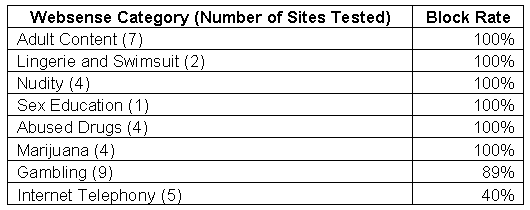
D. Longitudinal Testing Results
We compared the results from our 2004 proxy testing with the 2005 in-country results to examine how Yemen changed its filtering policies in the intervening period. Change was minimal: nearly all sites (94%) tested in both 2004 and 2005 yielded the same result, with 96% of the 2005 TeleYemen/YNET results matching those from 2004, and 92% for YemenNet. There are three possible explanations why sites might have divergent results: the proxy testing yielded inaccurate results, the ISP changed its filtering policy, or Websense changed the site's categorization from a non-activated category to an activated one (i.e., one selected for filtering) or vice versa. We conclude that our proxy testing was extremely accurate given the high degree of overlap from the two methods, and that 87% of the sites with divergent results were in a limited number of content areas. For example, YemenNet blocked 20 illegal drug sites in 2005, but filtered none of these sites in 2004. We believe that the remainder of the difference between ONI's 2004 and 2005 results were caused by changes in Websense's categorization.
1. TeleYemen/YNET
The chart below presents categories from our global list where TeleYemen's block rate changed between 2004 and 2005. The full results, including the URLs of all sites whose results changed, are available in Appendix 6.

We found a modest increase in the absolute amount of blocking of the global list sites, from 10% to 12%, from 2004 to 2005. This increase resulted almost entirely from a dramatic increase in the blocking of GLBT sites. In 2004, the only GLBT block we detected was a Middle East-specific site (www.gayegypt.com). In 2005, a much wider range of this material was inaccessible within Yemen. Our Websense category testing leads us to conclude that TeleYemen activated the Websense "Gay or Lesbian or Bisexual Interest" at some point between the 2004 and 2005 testing. The change in accessibility of pornographic material is slightly puzzling; it is rare for porn sites to go from blocked to accessible in states that filter this material.
2. YemenNet
The chart below highlights categories of interest from our global list where YemenNet's block rate changed between 2004 and 2005. The full results, including the URLs of all sites whose results changed, are available in Appendix 7.
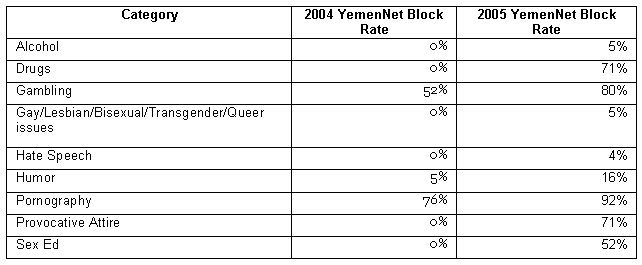
The overall level of filtering on YemenNet rose dramatically between 2004 and 2005, from 6% to 14%. The majority of the increase stemmed from several apparent policy changes: addition of the blocking of illegal drug-related content, expansion of blocking of sexually-themed content, and improvement in blocking of gambling sites. The increase in pornography filtering appears to result from using Websense to filter provocative attire and sex education sites. ONI's previous research demonstrates the difficulty commercial filtering software products, such as Websense, have in distinguishing between sexually explicit Web sites and non-explicit sites on sexual topics; a common example is the blocking of sites with information about breast cancer based on an erroneous classification of the content as pornography. The increased effectiveness of pornography blocking from 2004 to 2005 (76% to 92%) appears to reflect a decision to cast a wider net and to accept overblocking that makes some otherwise non-offensive sites unavailable.
The change in the filtering of drug-related content on YemenNet was dramatic, and our Websense testing indicates that YemenNet activated the relevant content category in the period between our tests. Less dramatically, YemenNet increased the effectiveness of its filtering of gambling sites, and began to block a small number of Middle East-focused GLBT sites. Interestingly, YNET moved from filtering only Middle East GLBT sites to much wider blocking of this content at the same time that YemenNet went from not blocking any GLBT content to blocking only Middle East specific GLBT content. This may indicate increased concern by the Yemeni state about this material.
3. Proxy Services
In addition, our testing in January 2006 demonstrates that YemenNet and TeleYemen/YNET have both increased their efforts to block proxy server sites and to prevent users from bypassing the ISPs' content controls.
5. CONCLUSION
Yemen imposes controls on Internet usage through formal laws regulating what material the press may cover, informal pressures to shape reporting, and filtering software that blocks certain content. The state focuses its Internet filtering efforts most consistently on pornography and related sexually themed content, as well as sites providing proxy servers that bypass filters, but users of the two principal ISPs will find different types of sites unavailable. Yemenis connecting to the Internet via TeleYemen/YNET will be unable to access most gay and lesbian-related content and will have limited access to sites targeting the religious conversion of Muslims, but will have generally unimpeded access to illegal drug and gambling-related sites. Yemenis connecting via YemenNet, however, will find only Middle East-focused gay and lesbian sites unavailable, face no restrictions on religious conversion sites, but be largely unable to get to drug or gambling sites. Users of both networks will likely experience small amounts of the apparently unintended blocking that generally accompanies any wide-spread internet filtering. Despite an extensive search, we found no evidence that the Yemeni state seeks to prevent access to political or media materials online. Thus, while Yemen's Internet filtering is quite broad in a few areas, the state tends to limit its blocking to these topics. However, the additional restrictions on press freedom proposed by the Ministry of Information in the new draft press law may indicate a shift toward generally more conservative policies.
Appendix 1. Original Global List Testing Results
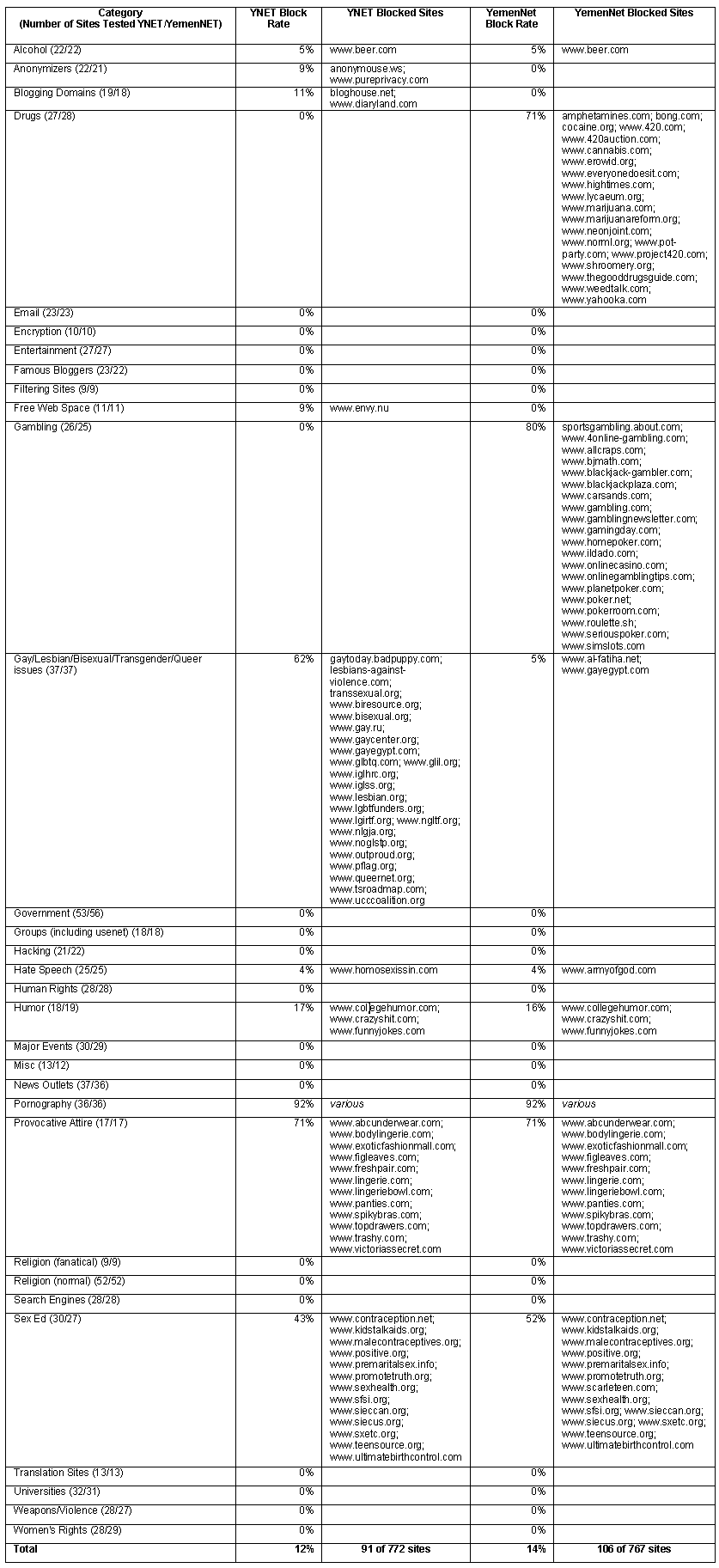
Appendix 2. Revised Global List Testing Results
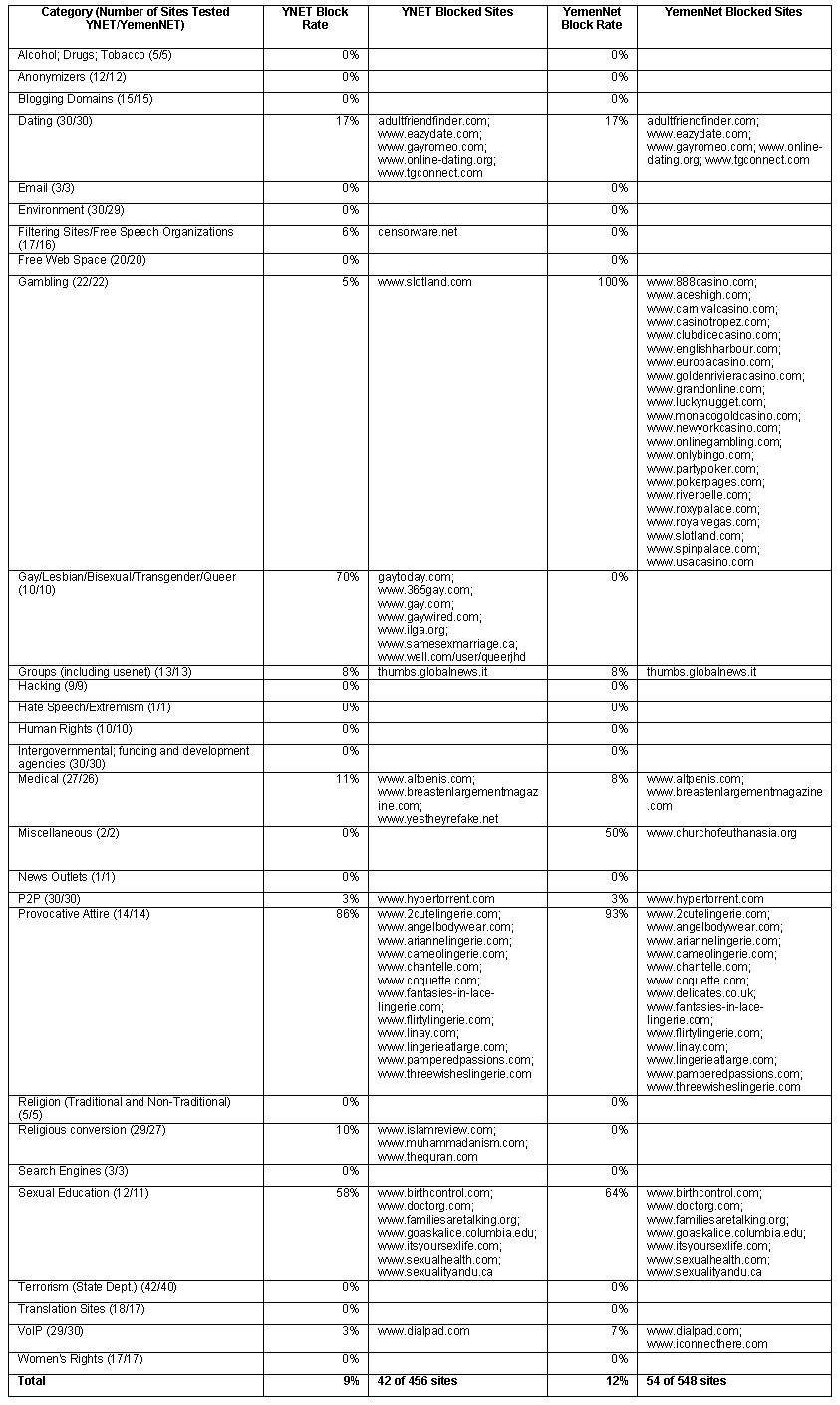
Appendix 3. High Impact Testing Results
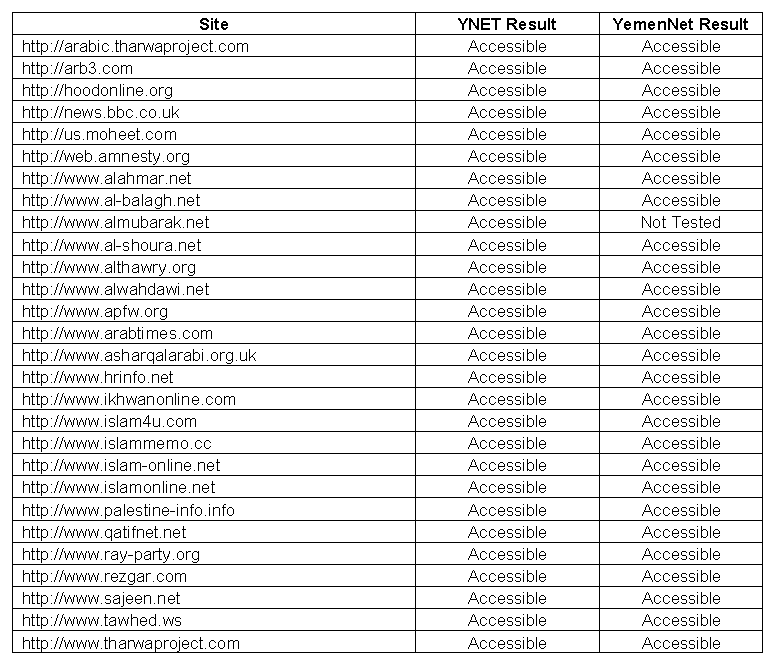
Appendix 4. List of Proxy / Circumvention Sites Blocked by TeleYemen/YNET and YemenNet
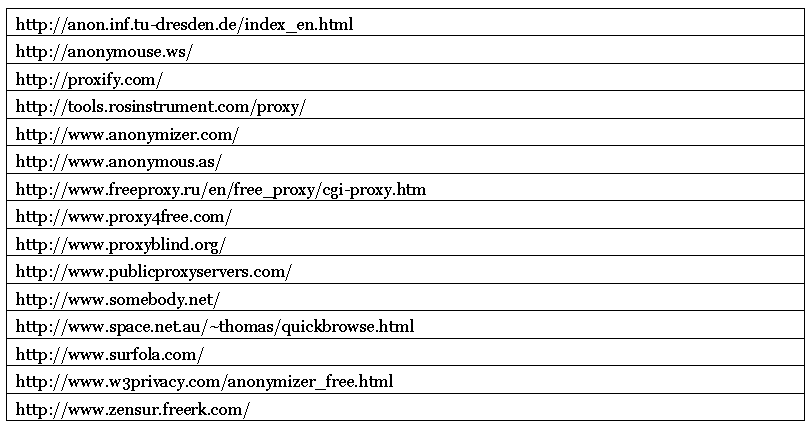
Appendix 5. Websense Category Testing Results

Appendix 6. TeleYemen/YNET Global List Testing 2004 vs. 2005
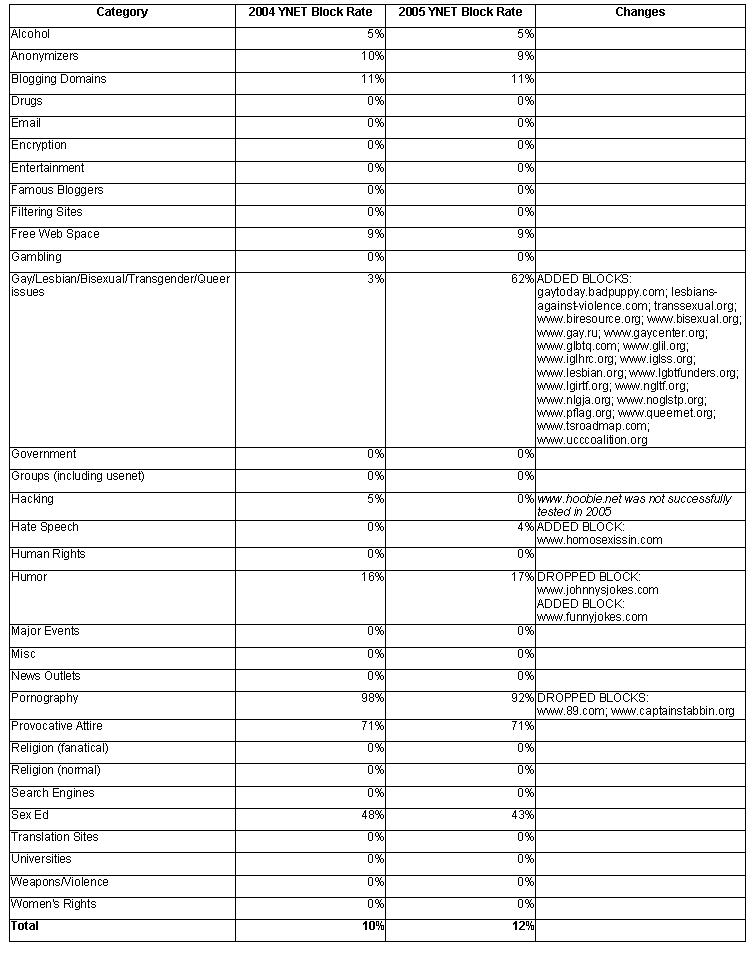
Appendix 7. YemenNet Global List Testing 2004 vs. 2005
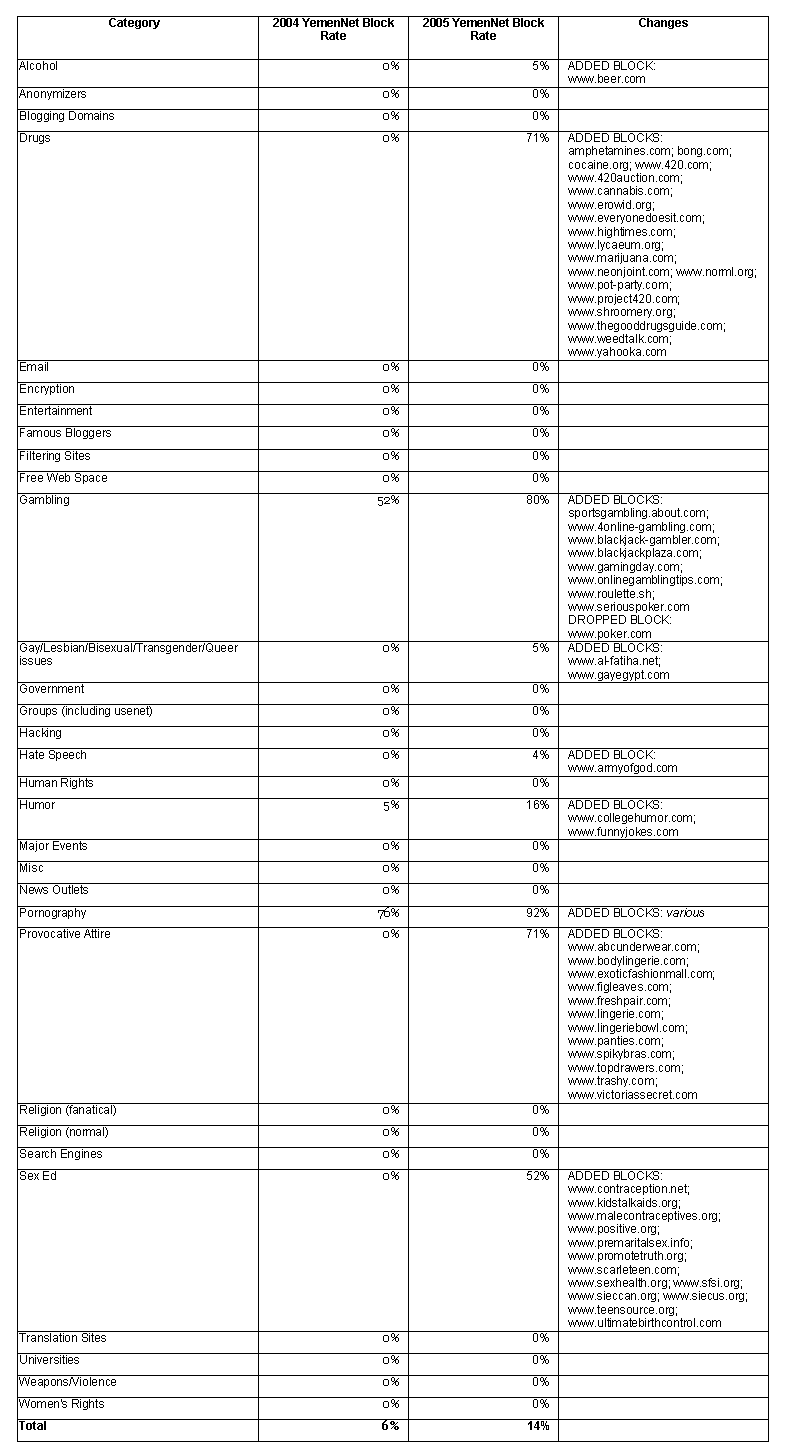
Appendix 8. Copy of TeleYemen/YNET Block Page
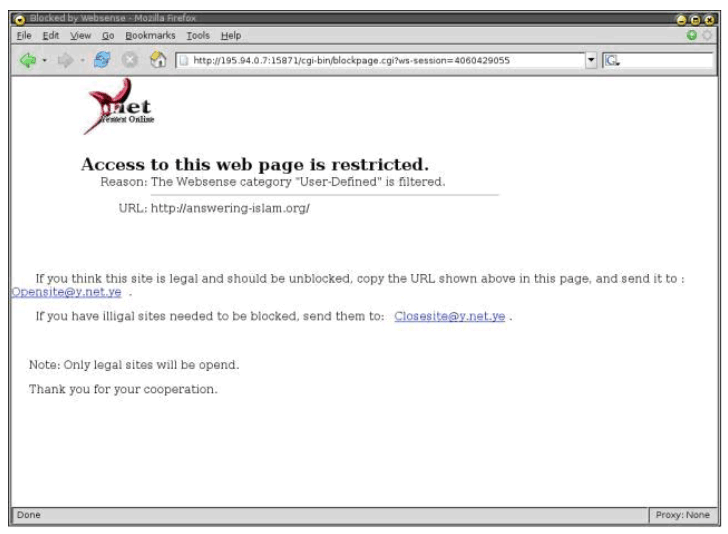
Appendix 9. Copy of YemenNet Block Page

Appendix 10. Yemen Background
A. General Description
Located in the Middle East, Yemen borders Saudi Arabia and Oman. Most of Yemen's 20 million inhabitants are Muslim, although small minorities of Christians, Hindus and Jews reside there as well.85The population was estimated at 20 million in July 2004, with an age distribution skewed towards youth ? almost 50% of the population is under age 15.86 Yemen is comparatively poor, with high economic dependence on its oil and agricultural sectors.87The state depends on oil for 70% of its revenue and is vulnerable to changes in oil prices.88 Political dissension and the rapid growth of the population have made International Monetary Fund restructuring efforts difficult, and Yemen remains one of the poorest Arab countries; the per capita GDP is US$800 a year (compared to $37,800 a year in the U.S.).89 The state resolved a long-standing border dispute with Saudi Arabia through a treaty in 2000.90
B. Political System
The Republic of Yemen was produced by the 1990 unification of North Yemen and South Yemen, which were independent states. The South developed along Marxist lines; the North remained relatively progressive, attracting migrants from the South. In 1994, the newly united state faced a secessionist movement in the south. This led to a civil war in which Yemen quickly suppressed the secessionists.
The state is a nominal democracy; the current president, Ali Abdullah Salih, has been in power since the 1990 merger. The president is elected by popular vote for a seven-year term. The executive branch wields most power politically despite theoretical checks by the legislature and judiciary.91There are more than 12 active political parties in Yemen, but the two most significant are the General People's Congress (GPC, Salih's party) and the Islamic Reform Grouping. Yemen's "Constitution prohibits the establishment of parties that are contrary to Islam, oppose the goals of the country's revolution, or violate the country's international commitments."92Yemen also has an elected House of Representatives (dominated by the GPC) and an appointed Shura Council that comprise its legislature.93The judiciary, which is headed by a Supreme Court in the capital of Sana'a, is nominally independent but effectively weak.94
Footnotes
1 The OpenNet Initiative wishes to thank a reviewer and volunteer from Yemen who prefers to remain anonymous.
2 U.S. Department of State, Yemen: Country Reports on Human Rights Practices -- 2003, at http://www.state.gov/g/drl/rls/hrrpt/2003/27942.htm (Feb. 25, 2004).
3 Presidential pardon to imprisoned journalist, Yemen Observer, Mar. 23, 2005, at http://www.yobserver.com/cgi-bin/yobserver/exec/view.cgi/1/4310.
4 U.S. Department of State, Yemen: Country Reports on Human Rights Practices 2003.
5 U.S. Department of State, Yemen: Country Reports on Human Rights Practices 2003.
6 International Press Institute, Yemen: 2003 World Press Freedom Review, at http://www.freemedia.at/wpfr/Mena/yemen.htm.
7 Yemen to close 4,000 religious schools, The Yemen Times, Feb. 10, 2005, at http://www.yementimes.com/article.shtml?i=815&p=local&a=1.
8 Yemen to close 4,000 religious schools, The Yemen Times.
9 1,149,000 Telephone Lines in Yemen, The Yemen Observer, Oct. 27, 2005, available at http://www.yobserver.com/cgi-bin/yobserver/exec/view.cgi/1/8522.
10 CIA, The World Factbook ? Yemen.
11 Economist Intelligence Unit, Country Profile Yemen 2004: Main Report.
12 CIA, The World Factbook ? Yemen.
13 The Arabic Network for Human Rights Information, Yemen: All Roads Lead Backwards, June 2004, at http://www.hrinfo.net/en/reports/net2004/yemen.shtml (citing an article on the Al-Riyadh newspaper Web site in September 2003).
14 Economist Intelligence Unit, Country Profile Yemen 2004: Main Report.
15 Helmi Noman, An Overview of The Demographics and Usage Patterns of Internet Users in Developing Countries: Yemeni Internet Population as a Case Study, United Nations Development Programme, at http://www.undp.org.ye/ict.php.
16 Helmi Noman, An Overview of The Demographics and Usage Patterns of Internet Users in Developing Countries: Yemeni Internet Population as a Case Study.
17 The Arabic Network for Human Rights Information, Yemen: All Roads Lead Backwards.
18 Helmi Noman, An Overview of The Demographics and Usage Patterns of Internet Users in Developing Countries: Yemeni Internet Population as a Case Study.
19 See http://www.yemen.net.ye.
20 See http://www.yemen.net.ye.
21 Yemen.net.ye, Dial-up Connection, at http://www.yemen.net.ye/en/index.php?q=dailup.
22 See http://www.websense.com/.
23 Helmi Noman, An Overview of The Demographics and Usage Patterns of Internet Users in Developing Countries: Yemeni Internet Population as a Case Study.
24 Helmi Noman, An Overview of The Demographics and Usage Patterns of Internet Users in Developing Countries: Yemeni Internet Population as a Case Study.
25 U.S. Department of State, Yemen: Country Reports on Human Rights Practices 2003.
26 Brian Whitaker, Freedom of the Press in Yemen, Yemen Gateway, Apr. 29, 2001, at
http://www.al-bab.com/yemen/media/bwmed.htm.
27 U.S. Department of State, Yemen: Country Reports on Human Rights Practices 2003.
28 U.S. Department of State, Yemen Human Rights Practices, 1995, March 1996, available at http://dosfan.lib.uic.edu/ERC/democracy/1995_hrp_report/95hrp_report_nea/Yemen.html (documenting anonymous threats aimed at Yemen Times journalists and the abduction and beating of journalist Abu Bakr Al-Saqqaf); International Organizations Call for Release of Zaidi, The Yemen Times, Sept. 24, 2001, at http://www.yementimes.com/01/iss39/front.htm (reporting the imprisonment, without a given cause, of journalist Hassan al-Zaidi).
29 U.S. Department of State, Yemen: Country Reports on Human Rights Practices 2003.
30 Committee to Protect Journalists, Attacks on the Press 2003: Yemen, at http://www.cpj.org/attacks03/mideast03/yemen.html.
31 Yemen's commitment to democracy questioned, The Yemen Times, Jan. 17, 2005, at http://www.yementimes.com/article.shtml?i=808&p=front&a=3.
32 Yemen's commitment to democracy questioned, The Yemen Times (al-Hawthi is a transliteration of the same name).
33 See, e.g., Arab Press Freedom Watch, IFJ Joins Yemeni Journalists in Protest Over "Shocking Injustice" and Jail Threat to Editor, Sept. 7, 2004, at http://www.apfw.org/indexenglish.asp?fname=news\english\12700.htm.
34 Committee to Protect Journalists, CPJ protests journalist's imprisonment, Sept. 16, 2004, available at http://www.cpj.org/protests/04ltrs/Yemen16sept04pl.html.
35 Jailed Yemeni journalist pardoned, Aljazeera.Net, Mar. 23 2005, at http://english.aljazeera.net/NR/exeres/F53E1CAE-A4FE-44B3-88B7-7C9286D3A4C9.htm.
36 Government has hurt itself, The Yemen Times, Feb. 12, 2004, at http://www.yementimes.com/article.shtml?i=711&p=view&a=1.
37 Republic of Yemen, Press and Publications Law, available at http://www.yemeninfo.gov.ye/eng/press%20Low_english.pdf.
38 Article 4, Press and Publications Law.
39 Article 3, Press and Publications Law.
40 Articles 7 & 10, Press and Publications Law.
41 Articles 27-29, Press and Publications Law.
42 Article 31, Press and Publications Law.
43 Article 20, Press and Publications Law.
44 Article 30(a), Press and Publications Law.
45 Article 34, Press and Publications Law.
46 Article 76, Press and Publications Law.
47 Article 57, Press and Publications Law.
48 YEMEN: Journalists reject new draft of press and publications law, Reuters AlertNet, May 3, 2005, at http://www.alertnet.org/thenews/newsdesk/IRIN/b700da8f8df8a9ac29a1a4d7f6cb2c4b.htm.
49 Journalists reject draft press law, Yemen Times, at http://yementimes.com/article.shtml?i=837&p=front&a=2.
50 Abdul-Aziz Oudah, Yemeni Journalists Reject Modified Press Law, Yemen Observer, Sept. 29, 2005, available at http://www.yobserver.com/news_8297.php.
51 Mohammed Al-Asadi, International Concerns Over Press Law, Yemen Observer, Dec. 3, 2005, available at http://www.yobserver.com/cgi-bin/yobserver/exec/view.cgi/1/8776.
52 U.S. Department of State, Yemen: Country Reports on Human Rights Practices 2003.
53 YEMEN: Journalists reject new draft of press and publications law.
54 BBC News, Country Profile: Yemen, at http://news.bbc.co.uk/2/hi/middle_east/country_profiles/784383.stm#media (Aug. 11, 2004) (noting that "The Ministry of Information controls all broadcasting through the Public Corporation for Radio and Television" along with "most printing presses" and it "funds some newspapers"). See Saba, at http://www.sabanews.gov.ye/html/about_saba_e.html (noting that "Saba reports to the Ministry of Information"); see also Brian Whitaker, Freedom of the Press in Yemen, Yemen Gateway, Apr. 29, 2001, at
http://www.al-bab.com/yemen/media/bwmed.htm; Yemen Gateway, The Media in Yemen, Dec. 30, 2001, at http://www.al-bab.com/yemen/media/med.htm (listing Yemeni media sources).
55 International Press Institute, Yemen: 2003 World Press Freedom Review.
56 U.S. Department of State, Yemen: Country Reports on Human Rights Practices 2003.
57 International Press Institute, Yemen: 2003 World Press Freedom Review.
58 U.S. Department of State, Yemen: Country Reports on Human Rights Practices 2003.
59 U.S. Department of State, Yemen: Country Reports on Human Rights Practices 2003.
60 Teleyemen.ye.net, Introduction, at http://www.teleyemen.com.ye/intro.htm.
61 The Arabic Network for Human Rights Information, Yemen: All Roads Lead Backwards.
62 U.S. Department of State, Yemen: Country Reports on Human Rights Practices 2003.
63 See, e.g., United Nations Development Programme, Yemen Country Profile, at
http://www.undp.org.ye/y-profile.htm.
64 See Y.Net, Leased Line, at http://www.y.net.ye/services/leasedline.htm; YemenNet, Leased Line, at http://www.yemen.net.ye/en/index.php?q=leasedline. Conversion from Yemeni to U.S. currency can be accomplished using online converters such as the Universal Currency Convertor, available at http://www.xe.com.
65 Y.Net, Terms & Conditions, at http://www.y.net.ye/support/rules.htm.
66 The Arabic Network for Human Rights Information, Yemen: All Roads Lead Backwards.
67 See Gulf Press Freedom Center (GPFC), Background and Goals, at http://www.wmd.org/gpfc/gpfc.html#background.
68 William New, Internet Touted As Democratizing Tool In Arab Region, National Journal's Technology Daily, Aug. 5, 2004.
69 See World Summit on the Information Society, Declaration of Principles, Dec. 12, 2003, at http://www.itu.int/wsis/docs/geneva/official/dop.html.
70 See generally Mary Bridges, WSIS ? Conference Hype or Lasting Change?, Jan. 23, 2004, at http://cyber.law.harvard.edu/briefings/wsis.
71 We were only able to perform keyword testing on the YemenNet network due to the complexities and risk of in-country testing.
72 See, e.g., U.S. Department of State, Yemen: Country Reports on Human Rights Practices 2003.
73 See Websense Inc., URL Categories, at http://ww2.websense.com/global/en/ProductsServices/MasterDatabase/URLCategories.php.
74 See Homo Sex Is Sin!, at http://www.homosexissin.com/.
75 Gambling was the only one of these categories where less than 100% of sites (89%) tested were blocked. These descrepancies are generally caused by difficulties in determining the version of the site classification database used by the filtering state at the time of testing.
76 See Appendix 1 for categorized results of our standard global list testing. Appendix 2 contains the full results of our new global list testing. To provide comparable results across multiple country studies, the majority of the sites in our global list have content only in English.
77 A small percentage of URLs tested returned errors that could have been generated at various "hops" between the requesting computer and the site's host server. Since both ISPs in Yemen respond to a request for a filtered site with a block page, we only considered sites that generated a block page as filtered.
78 We checked rankings at www.alexa.com on Jan. 1, 2006.
79 See Appendix 3 for a complete list of the sites.
80 We obtained classification results from Websense's database at http://www.websense.com/global/en/SupportAndKB/SiteLookup/index.php on Jan. 1, 2006 (log-in required).
81 We obtained these sites at http://www.google.com/Top/Computers/Internet/Proxying_and_Filtering/Hosted_Proxy_Services/.
82 See Appendix 4 for a complete list of these blocked sites.
83 This site is available at http://www.anonymizer.com.
84 This software can be downloaded from http://anon.inf.tu-dresden.de/index_en.html.
85 CIA, The World Factbook ? Yemen, at http://www.cia.gov/cia/publications/factbook/geos/ym.html (Nov. 30, 2004).
86 CIA, The World Factbook ? Yemen.
87 Economist Intelligence Unit, Country Profile Yemen 2004: Main Report (Oct. 8, 2004).
88 U.S. Department of State, Background Note: Yemen, Sept. 2004, at http://www.state.gov/r/pa/ei/bgn/35836.htm.
89 CIA, The World Factbook ? Yemen.
90 U.S. Department of State, Background Note: Yemen.
91 U.S. Department of State, Yemen: Country Reports on Human Rights Practices 2003.
92 U.S. Department of State, Yemen: Country Reports on Human Rights Practices 2003.
93 U.S. Department of State, Yemen: Country Reports on Human Rights Practices 2003.



